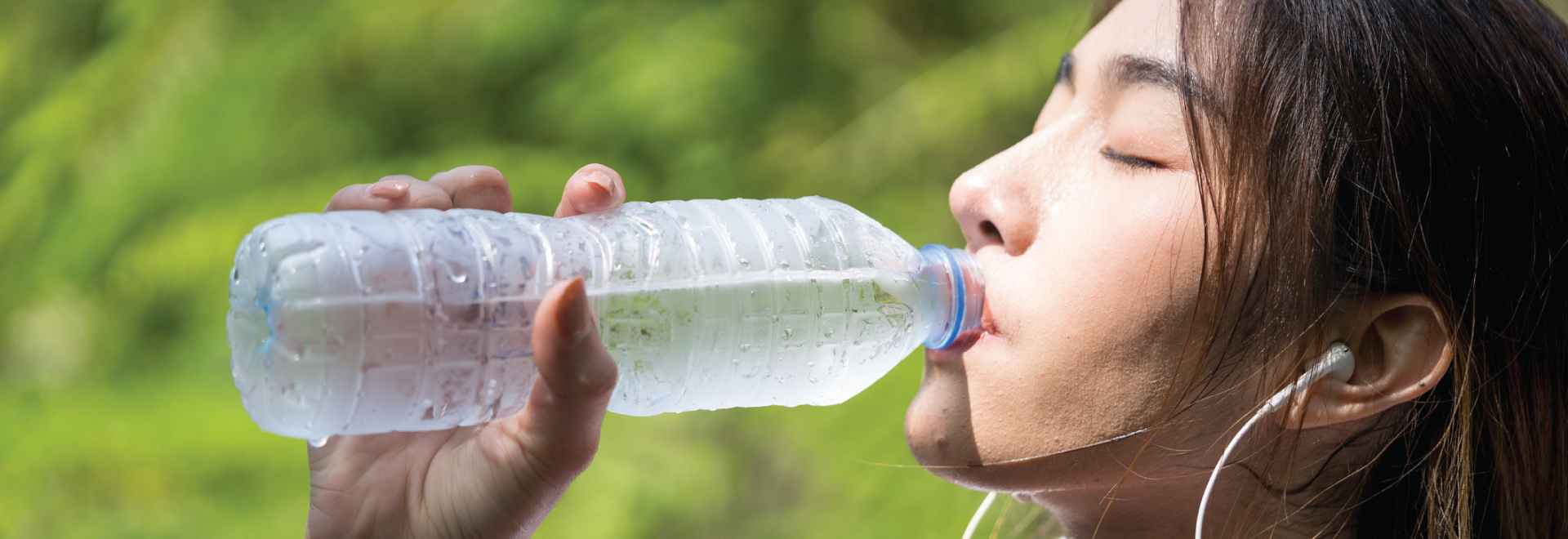Western countries, such as the United Kingdom and Australia, supply hard water that some may find a bit difficult to adapt while traveling or living. According to the Water Supplies Department (WSD), treated water is soft in nature. It contains a small number of minerals and remains visually clear. Many may know the terms ‘hard water’ and ‘soft water,’ but do you know the differences between these types of water? Let’s learn more about their differences and health benefits in this Cigna Smart Health article.
Differences Between Hard Water and Soft Water
The World Health Organization defined that the hardness of water depends on the mineral content, especially calcium carbonate and magnesium carbonate. The higher the concentration of calcium carbonate present, the harder the water is. Below are the benchmarks of water hardness according to the Organization.
- Soft water: Water containing calcium carbonate at concentrations below 60 mg/l
- Moderately hard water: Water containing calcium carbonate at concentrations 60–120 mg/l
- Hard water: Water containing calcium carbonate at concentrations 120–180 mg/l
- Very hard water: Water containing calcium carbonate at concentrations more than 180 mg/l
As the WSD examinations on the water quality of Hong Kong between Apr 2020 and Mar 2021 showed, the calcium carbonate content in local drinking water ranged from 5 mg/l to 69 mg/l with an average value of 40 mg/l, which is considered soft water. It is possible due to the low calcium and magnesium concentration in the water sources. Generally, the relevant minerals in rocks are deposited or dissolved in water when washing. Therefore, the mineral content in the water is closely related to geographical locations.
Countries with Hard Water
Many foreign countries and regions supply hard water, such as the UK, USA, Australia and Canada. Major cities in the UK (London, Oxford, Reading, and Newcastle) and an overwhelming 85 percent of the USA have hard water. Different areas in Australia offer drinking water of various hardness. While hard water is supplied in Perth, Sydney, and Tasmania exhibit soft water. In Canada, water in Vancouver is naturally soft, but it is hard in Toronto. Before traveling, you’d better have a search the water hardness of your destination online.
Health Benefits of Hard Water
Some research from the Nordic countries, such as Sweden and Finland pointed out that those drinking hard water have a lower risk and death rate of cardiovascular diseases (like strokes and heart diseases). Researchers believe that the richer mineral content in hard water contributes to heart health. However, there is no definite and clear relation between the two, with varying results shown among studies.
So, is drinking hard water more beneficial to your health? According to Jason Lee, an Australian registered dietitian, maintaining a balanced diet is enough to help you absorb necessary nutrients and minerals while not deliberately drinking hard water. Even though you drink hard water daily, you may still have nutrition deficiencies. Besides, soft water can give a better taste when brewing your tea and cooking rice due to its lower mineral content.
Can Hard Water Cause Hair Loss and Kidney Stones?
Some say that drinking hard water in daily life may lead to hair loss and kidney stones. Regarding its effect on your health, Jason also explained that the minerals might accumulate on the hair surface and block the hairpieces, causing hair loss in the long term. However, there is no evidence showing drinking hard water contributes to kidney stones. If you have health concerns, infants and individuals with weaker kidney functions should avoid drinking too much hard water.
WSD previously pointed out that excessive calcium and magnesium in tap water may greatly undermine the effectiveness of cleaning products, such as soap and laundry detergent. The minerals may also stay in the clothing fiber, stiffening your clothes. Regarding the hair loss problem, the Department has stated that it does not have a sounding ground.
Health Benefits of Soft Water
Since there are fewer minerals in soft water, it is less irritative to your skin. Water scale caused by the minerals in hard water may also block the pipes of your water heater or washing machine.
Tap water in Hong Kong belongs to soft water, but how about bottled mineral water sold in the market? As mentioned above, it depends on the concentration of calcium carbonate in specific branded mineral water. If it reaches the benchmark, it is also considered hard water. You can take a look at their nutrient labels before purchasing next time!
Another point worth mentioning is that bottled distilled water does not contain minerals. Natural mineral water or simply mineral water is also beneficial for your health. However, infants, the pregnant, the elderly, and individuals with chronic diseases, autoimmune disorders, and under immune response reducing therapy are suggested to have bottled distilled water or boiled water instead.
Besides, those with kidney disease or cardiovascular disease should limit their electrolyte intake every day by taking caution about drinking too much mineral water. Please consult your doctor for more detailed advice.
Source
- Water Use Tips
- Drinking Water Quality for the Period of October 2020 to September 2021
- Hard Water vs. Soft Water: Which One Is Healthier?
- Water Supplies Department - Vol.87 - Decryption of Water Codes
- Soft water or hard water|Understanding the hardness of water in one article, experts dismantle urban rumors of "turning over water to cause cancer"
- How to distinguish between soft water and hard water? Should soft water be used for cooking?
© Cigna Healthcare 2023
Information provided in this article is intended for health and fitness purposes only and is not intended for use in the diagnosis of disease or other conditions, or in the cure, mitigation, treatment or prevention of disease (see Terms & Conditions for details). Any health-related information found in this article is available only for your interest and should not be treated as medical advice. Users should seek any medical advice from a physician, especially before self-diagnosing any ailment or embarking on any new lifestyle or exercise regime. Any information contained in this article may not be suitable, accurate, complete or reliable. Cigna Healthcare accepts no responsibility for the content or accuracy of information contained on external websites or resources, or for the security and safety of using them. "Cigna Healthcare" and the "Tree of Life" logo are registered trademarks of Cigna Intellectual Property, Inc. in the United States and elsewhere, licensed for use. All products and services are provided by or through operating subsidiaries, and not by The Cigna Group.



